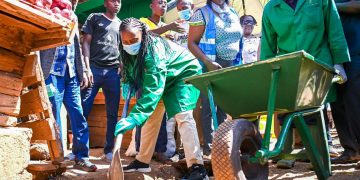By Eunice Mwathi and Daniel Omwoyo
Health Cabinet Secretary Aden Duale has launched three landmark reports aimed at strengthening Kenya’s health system, improving service delivery, and fast-tracking the country’s journey toward Universal Health Coverage (UHC).
The reports, the Kenya Quality of Care and Human Resources for Health Assessment, the Service Availability and Readiness Assessment (SARA), and the Reproductive, Maternal, Newborn, Child and Adolescent Health and Nutrition (RMNCAH+N) Investment Case were unveiled in Nairobi.
Duale said the documents mark the culmination of collaboration between the Ministry of Health, county governments, the private sector, faith-based organizations, and development partners.
“These findings offer valuable insights into the readiness of our health facilities, the strength of our workforce, and the actions needed to close persistent service delivery gaps,” he said.
According to the Ministry of Health, the reports provide a detailed snapshot of Kenya’s healthcare system and identify key investments required to deliver equitable, people-centred care.
Duale emphasized that access to quality healthcare is a constitutional right under Article 43 and noted that the reports align with the Bottom-Up Economic Transformation Agenda (BETA) and Sustainable Development Goal 3 on good health and well-being.
“By anchoring health system improvements within the BETA framework, we ensure our reforms remain people-centered, equitable, and responsive to the needs of all communities especially those historically underserved,” he said.
The Cabinet Secretary added that the findings will inform ongoing legislative and policy reforms, including the Quality of Healthcare and Patient Safety Bill, currently before the Senate.
“Investing in quality healthcare is not just a moral obligation it is an economic imperative. Healthy populations drive productivity and national growth,” Duale said.
The Service Availability and Readiness Assessment (SARA) showed that while essential services such as outpatient, maternal, and child health are available in most facilities, services for non-communicable diseases, mental health, cancer, and palliative care remain inadequate, particularly in rural and lower-level facilities.
Higher-level hospitals (Levels 4 and 5) demonstrated better preparedness but continue to face challenges such as staff shortages, stockouts of essential medicines, limited diagnostic capacity, and inconsistent use of clinical guidelines.
The Quality of Care and Human Resources for Health Assessment revealed that some lower-level facilities were offering services beyond their authorized levels — such as inpatient and surgical care — mainly in the private sector. The report also cited limited financial autonomy in public facilities, irregular supervision, and uneven implementation of quality improvement programmes.
Under the RMNCAH+N Investment Case, while basic maternal and newborn services were widely available, advanced emergency obstetric and neonatal care remained concentrated in referral hospitals. Services targeting adolescents, postnatal mothers, and nutrition were found to be underfunded and not sufficiently prioritized.
The Key recommendations from the reports include, Scaling up investment in facility capacity and service readiness. Reassessing facilities not aligned with the Kenya Essential Package for Health (KEPH). Developing a national human resource strategy to ensure equitable staff distribution and retention. Institutionalizing continuous professional development for healthcare workers. Ensuring universal access to clinical guidelines, supervision, and quality assurance frameworks.
Principal Secretary for Public Health Mary Muthoni said the assessments were conducted to improve accountability and ensure that health investments yield measurable results.
“Our objective was to evaluate service availability, readiness, and quality across all levels of care to strengthen accountability, enhance client satisfaction, and guide targeted resource allocation,” she said.
Principal Secretary for Medical Services Dr. Ouma Oluga added that the findings will serve as an evidence base for planning, budgeting, and policymaking.
“These reports will help us balance technical and non-technical human resources, strengthen facility capacity, and promote accountability within both national and county systems,” he said.
Duale acknowledged support from the Bill & Melinda Gates Foundation, Global Fund, UNFPA, UNICEF, and the World Health Organization (WHO) for their technical and financial contributions in developing the reports.
“These reports reaffirm our shared commitment to build a healthcare system that meets the expectations of our citizens and sets a benchmark for quality care across the region,” he said as he officially launched the documents.














